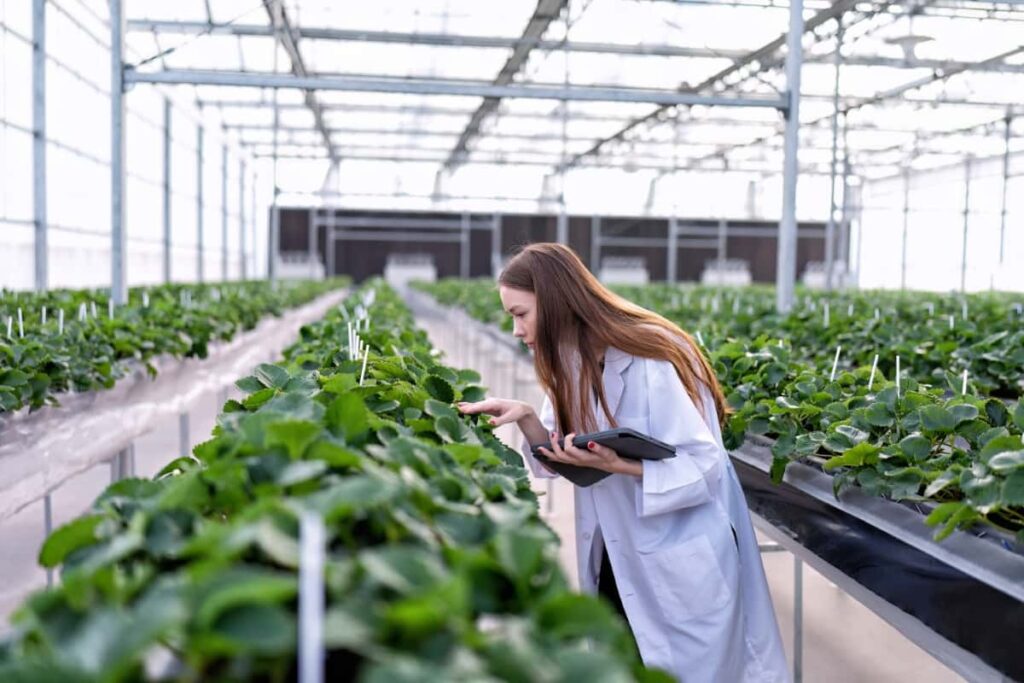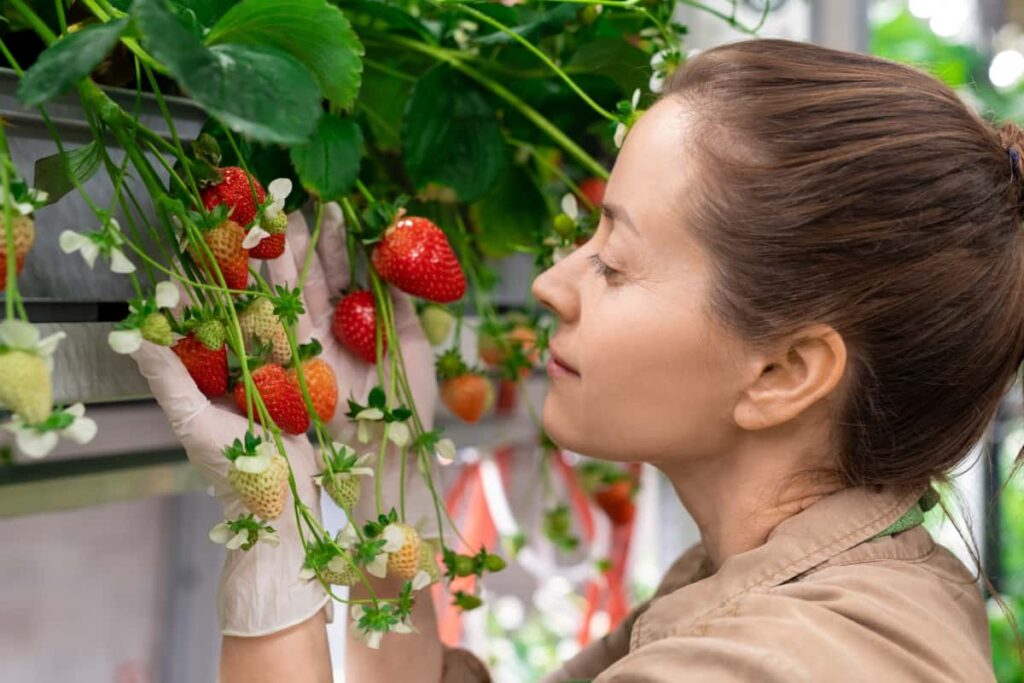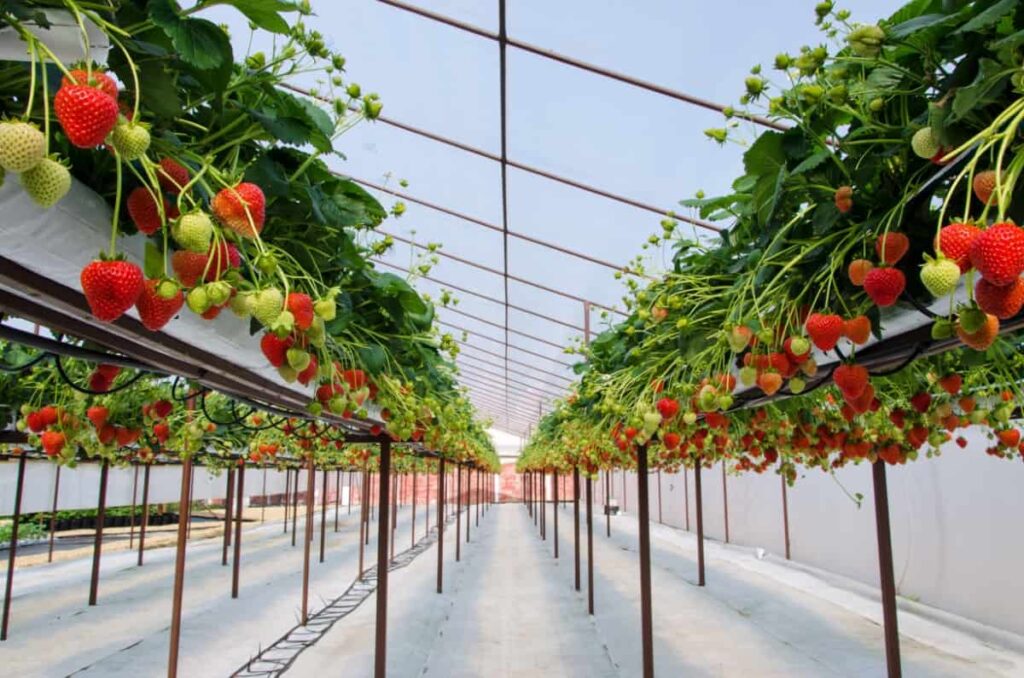Strawberries (Fragaria × ananassa) belong to the Rosaceae family and have captured the hearts of berry lovers worldwide with their sweet flavor and juicy texture. Hydroponic Strawberry is a modern agriculture, where these delicious berries are grown without soil. Instead, they thrive in a nutrient-rich water solution that provides everything they need to flourish.

Best Fertilizer for Hydroponic Strawberries
Overview of Strawberry Nutrition in Hydroponics
Essential Nutrients for Strawberries
Hydroponic Strawberries thrive on a precise balance of essential nutrients to reach their full potential. These berries require key macronutrients like nitrogen, phosphorus, and potassium for robust growth and development. Additionally, micronutrients such as iron, zinc, and magnesium are important in supporting various physiological processes within the plant.
The Importance of Fertilization in Hydroponic Strawberry Growth
The importance of fertilization in hydroponic Strawberries cannot be overstated. By providing the right mix of nutrients through a well-balanced fertilizer regimen, growers can ensure that their plants have everything they need to flourish. Fertilization directly impacts the overall health, vigor, and productivity of hydroponic Strawberries.
Understanding Strawberry Nutrient Requirements
Macronutrients: The Foundation for Strawberry Health
Macronutrients play a crucial role in establishing the foundation for the health and growth of your Strawberry plants. Nitrogen aids in leafy green growth and helps with photosynthesis, ensuring your plants are vibrant and healthy. Phosphorus contributes to root development and flower/fruit production, which is crucial for a bountiful harvest. Potassium assists in disease resistance and enhances fruit quality.
Micronutrients: Key Players in Strawberry Development
Micronutrients like iron, zinc, manganese, copper, boron, and molybdenum are vital for various physiological processes within the plant. Deficiencies in micronutrients in Strawberries can lead to stunted growth, yellowing leaves, poor fruit set, and overall reduced yield. This is why it’s important to ensure that your hydroponic nutrient solution contains the right balance of these key players for optimal Strawberry development.
Choosing the Best Fertilizers for Hydroponic Strawberries
Comparing Hydroponic Fertilizer Formulas
Each fertilizer formula is uniquely formulated to provide your plants with the nutrients they need to thrive and produce bountiful fruit. Comparing different hydroponic fertilizer formulas for Strawberries can help you determine which one aligns best with your specific growing conditions and goals. Some fertilizers may be tailored for certain stages of plant growth, while others offer a balanced nutrient profile suitable for overall development.
Organic Options for Hydroponic Strawberries
These natural options provide essential nutrients without synthetic chemicals, promoting healthier plants and tastier berries. Fish emulsion, seaweed extracts, and compost teas are major organic fertilizers that are rich in micronutrients that enhance Strawberry growth. By choosing organic options for growing hydroponic Strawberries, you can avoid harmful residues and support sustainable farming practices.
In case you missed it: Vertical Strawberry Farming: A New Way to Increase Your Income and Yield

Tailoring Nutrient Solutions to Strawberry Phases
Fertilizer Requirements for Vegetative Growth
During the vegetative growth stage, Strawberries need a balanced mix of macronutrients like nitrogen (N), phosphorus (P), and potassium (K) to promote healthy leafy growth. A well-balanced fertilizer formula tailored to these needs can ensure robust vegetative growth in your hydroponic Strawberry plants. By adjusting the nutrient solution composition based on the vegetative phase’s demands, you can provide your Strawberries with the essential elements they require for strong stems, lush foliage, and vigorous root systems.
Adjusting Nutrients for Flowering and Fruit Production
Adjusting nutrients for flowering and fruit production in hydroponic Strawberries is crucial for maximizing yield and quality. During this phase, the plant’s demand for certain nutrients changes to support the development of flowers and fruits. Adjusting the nutrient solution to provide higher levels of these elements can help ensure healthy flowering and abundant fruiting.
Optimizing Fertilizer Application in Hydroponic Systems
Dosing Strategies for Efficient Nutrient Uptake
Dosing strategies play a crucial role in promoting efficient nutrient uptake by the plants. One effective dosing strategy is to follow a regular schedule based on the growth stage of your hydroponic Strawberry plants. Providing the right nutrients at the right time can help support healthy development and maximize yields.
Another approach is to monitor your hydroponic system closely to adjust nutrient levels as needed. A recommended NPK ratio for hydroponic Strawberries might be 10-8-16 during the vegetative phase to promote leafy growth. As the plants transition into flowering and fruiting stages, adjusting the ratio to 8-10-20 can enhance flower formation and increase yield.
Timing and Frequency of Fertilization
It’s important to provide nutrients at the right stage of plant development to ensure optimal growth. For vegetative growth, fertilize more frequently to support leafy development. As the plants transition into flowering and fruit production, adjust the timing and frequency accordingly. Consistency is key – maintaining a steady routine will help prevent fluctuations in nutrient availability that can harm plant health.
Monitoring Strawberry Plant Health and Nutrient Levels
Identifying Signs of Nutrient Deficiencies
By monitoring their health and nutrient levels, you can proactively identify any signs of deficiencies before they impact your harvest. Yellowing leaves could indicate a nitrogen deficiency, while stunted growth might point to a lack of phosphorus. Keep an eye out for leaf discoloration or curling, as these could be signs of nutrient imbalances in Strawberries. Regularly check the pH and electrical conductivity (EC) levels in your nutrient solution to ensure that the Strawberries can absorb nutrients effectively.
Addressing Nutrient Toxicities in Strawberries
Nutrient toxicities in hydroponic Strawberries can wreak havoc on your plants, impacting growth and yield. Signs of nutrient toxicity may include leaf discoloration, stunted growth, or even wilting. To address this issue, it’s crucial to monitor the nutrient levels in your hydroponic system closely. Remember that prevention is important to managing nutrient toxicities in hydroponic Strawberries.
The Role of pH and Electrical Conductivity (EC) in Strawberry Nutrition
Managing pH for Optimal Nutrient Absorption
Strawberry plants mainly prefer a slightly acidic with a pH level of 5.5 to 6.5 for efficient nutrient uptake. Regularly monitoring and adjusting the pH of your hydroponic solution ensures that your Strawberries have access to the minerals they need to thrive.
EC Levels: Balancing Nutrient Concentration
Electrical conductivity (EC) indicates the amount of salts present in the nutrient solution, influencing how effectively plants can absorb essential nutrients. Aiming for a balanced EC level of hydroponic Strawberries, like 1.4-3.0 ds/cm, tailored to your specific growing conditions will promote robust root development and overall plant health.
Advanced Nutrient Management Strategies
Implementing Foliar Feeding for Quick Nutrient Uptake
By spraying a nutrient solution onto the plant leaves, you can bypass root absorption barriers and deliver essential nutrients straight to where they are needed most. This method allows for rapid absorption, enabling your Strawberries to thrive and flourish. Foliar feeding is especially beneficial during critical growth stages when plants require an extra boost of nutrients.
Enhancing Strawberry Flavor and Yield with Micronutrient Adjustments
Enhancing the flavor and yield of hydroponic Strawberries through micronutrient adjustments is a game-changer for growers. Balancing micronutrient levels is key to unlocking the full potential of your hydroponic Strawberry crop. Deficiencies or excesses in these nutrients can impact fruit development and flavor profiles. It’s crucial to monitor plant health closely and make necessary adjustments to ensure optimal growth.
In case you missed it: Strawberry Growing Information Guide

Troubleshooting Common Nutritional Issues in Hydroponic Strawberries
Solutions for Common Nutrient-Related Problems
One issue you might encounter is nutrient deficiencies, which can manifest through yellowing leaves or stunted growth. To remedy this, adjust your fertilizer mix to ensure all essential nutrients are being provided adequately. Nutrient toxicities can also occur if you overfeed your plants. Keep an eye out for signs like leaf burn or excessive foliage growth. Additionally, maintaining the right pH levels in hydroponic Strawberries is crucial for optimal nutrient absorption by your plants.
Preventive Measures to Avoid Nutrient Imbalances
To avoid nutrient imbalances in your hydroponic Strawberry system, start by regularly monitoring the pH and EC levels of your nutrient solution. Ensure that these levels are within the optimal range to promote healthy plant growth. Consider implementing a crop rotation plan to prevent nutrient depletion in your growing medium. Rotating crops helps maintain soil health and balance essential nutrients for robust Strawberry development.
In case you missed it: Lettuce Formula 8-15-36: Best Hydroponic Lettuce Masterblend Premium Fertilizer

Conclusion
In hydroponics, Strawberries can reach their full potential by receiving precise amounts of essential nutrients directly through their root systems. Additionally, by growing them hydroponically, we can tailor their nutrient intake precisely to ensure optimal growth and flavor. With proper care of nutrient levels, hydroponic Strawberries can produce high yields of succulent fruits that are bursting with flavor.
- Management Pests and Diseases in Your Cotton Field
- Sheep Farming Business Plan for Beginners
- Aquaponic Farming at Home: A Step-By-Step Guide
- Profitable Village Farming Business Ideas in 2024
- High-Yield Aquaculture: Fast-Growing Fish for Farming
- Effective Fish Pond Construction Techniques for Beginners
- Irrigation and Water Management in Pineapple Farming
- Blossom to Harvest: Mastering Flowering and Pollination in Papaya Farming
- Pig Fattening Essentials: From Selection to Sale for Beginners
